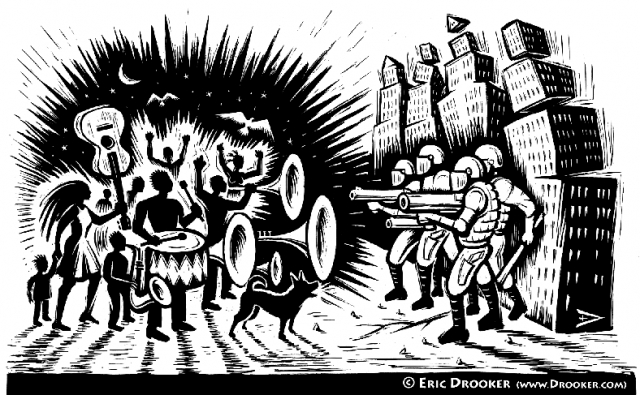Working Within the System is Not Working
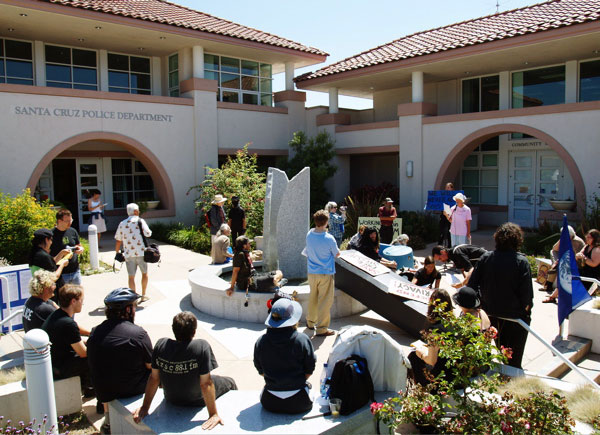
Following the press conference, people took to the streets to bring attention to the new SCPD policy on spying. Informational flyers were given to people who were standing outside their home, driving their cars or walking downtown. The marchers went from the police station on Center Street to the Farmers Market on Cedar Street, then up Pacific Avenue and eventually over to City Hall on Church Street.
At City Hall, 'Just Us' activists, again, tried to schedule a meeting with someone in city government. They also attempted to deliver a coffin with the words "Right to Privacy" and "Freedom of Assembly" to City Manager Dick Wilson. The city clerk said she would not sign for the coffin unless it was outside. It was brought outside, but she still would not sign for it and bring it in for Dick Wilson. Therefore, activists decided to bring the coffin back into the City Hall office and leave it on the floor.
- - - - - - - - -
For much more information about the Santa Cruz Police Department spying scandal, see:
City of Santa Cruz Fails to Resolve the Police Spying Scandal
http://indybay.org/newsitems/2006/07/01/18284537.php
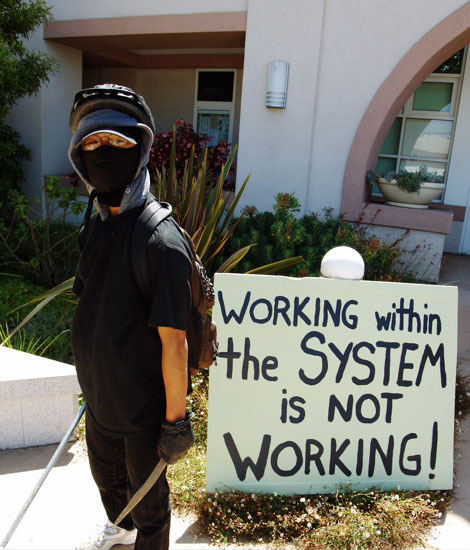
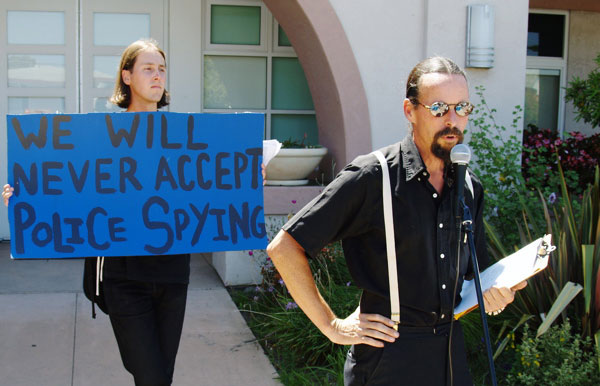
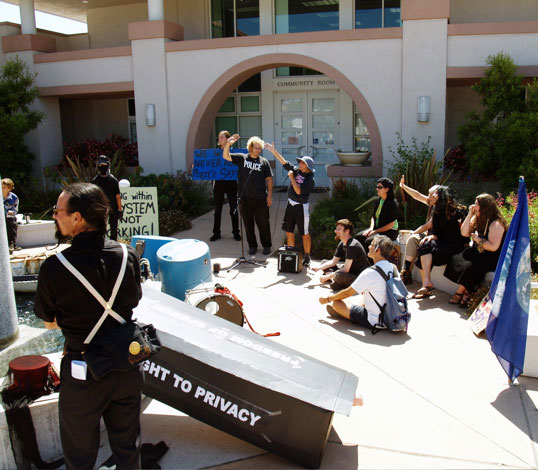
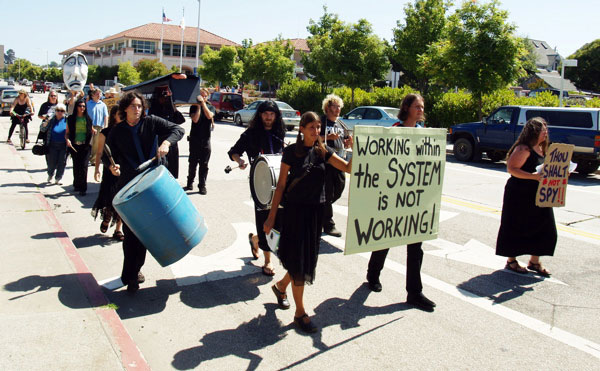
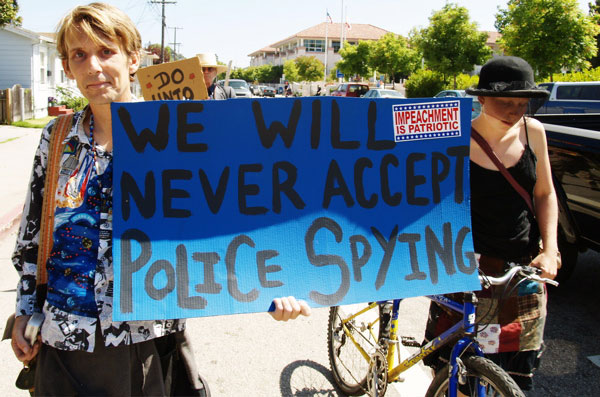
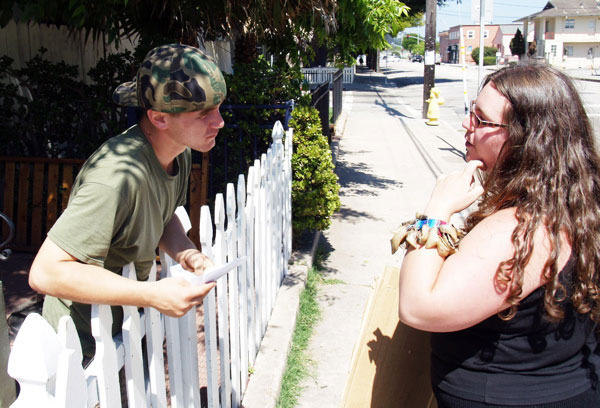
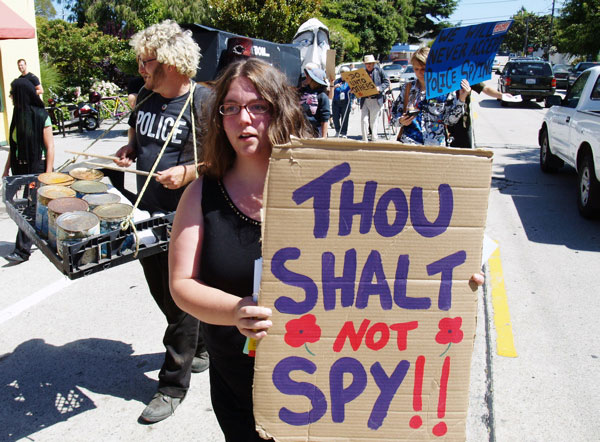
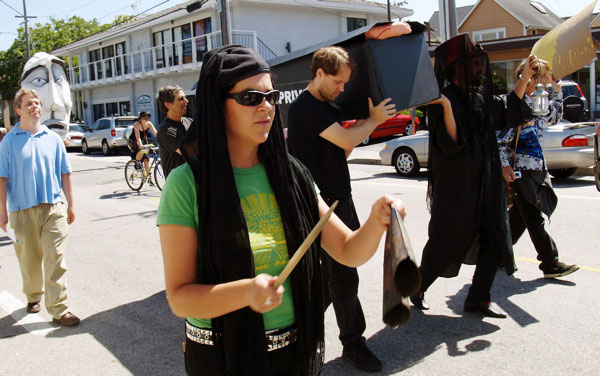
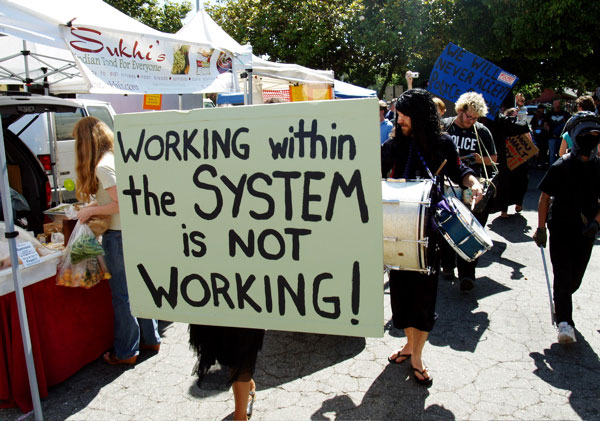
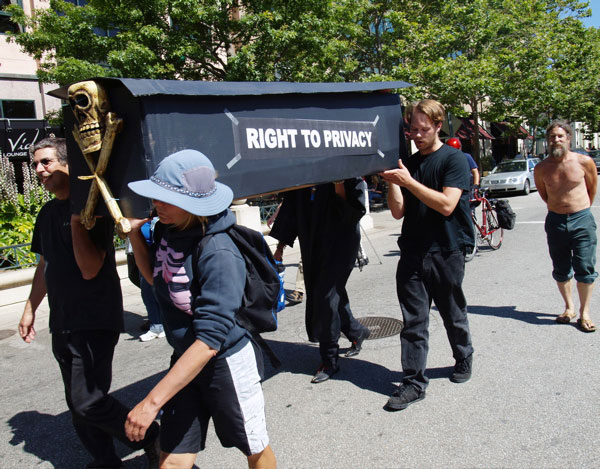
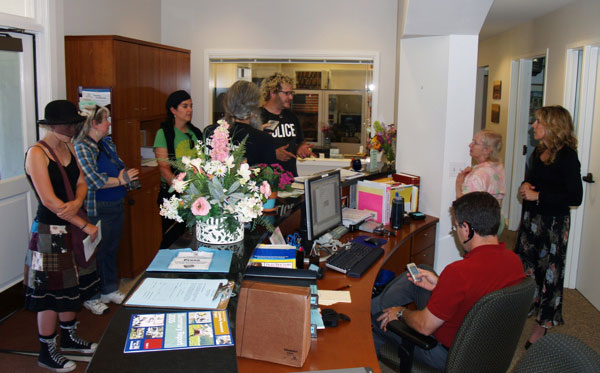
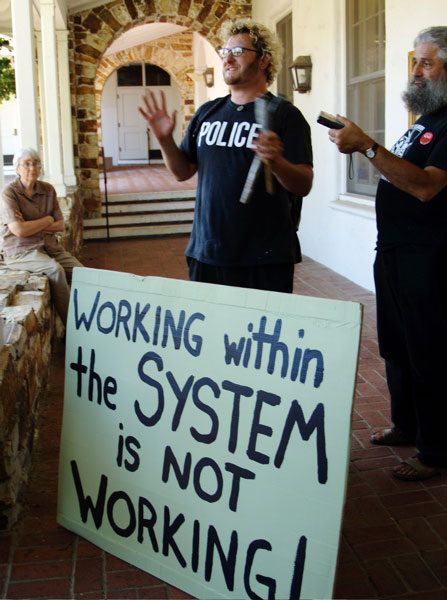
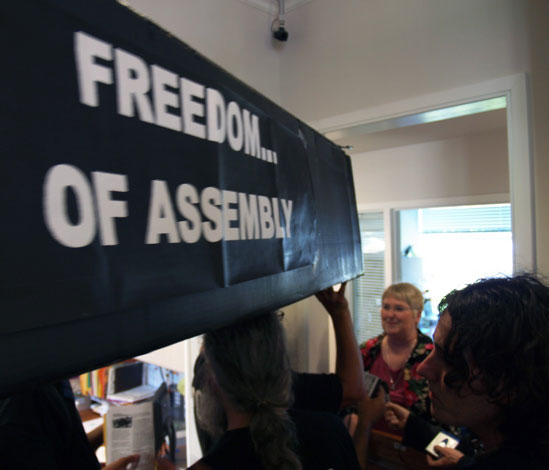
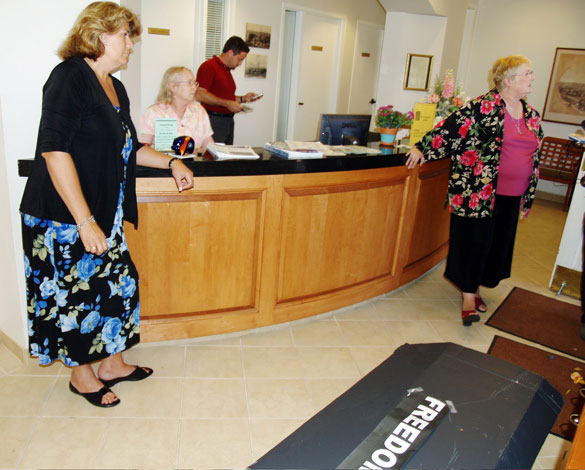
So the question was asked to me... "Well, what should we be doing?" I was not prepared to reply, but I did say that we should continue holding marches through the streets. The marches should have a clear message and focus. People should be passing out flyers with more information and links to websites with even more information and ways for people to get involved. The Last Rights March did a good job of passing out flyers to people in cars and on the sidewalks.
I also agree with the comment above "Direct Action?" by One Gear.
One last point. Fuck The Corporate Media.
Stop focusing demonstrations on getting a message out using the corporate media.
The handful of folks pursuing this particular issue of police spying on the last night parade have taken every course of action possible within the city’s bureaucracy (demanding an internal investigation, dialoging with city council members and the aclu, etc.) While I appreciate the effort and passion put into it, we can see it did not amount to much in terms of a policy. Folks actually went through all the channels that we are supposedly able to effect change through. It did not work in this instance and it never will.
Also, I did not see this as direct action. I saw it as a somewhat playful procession.
Our symbolic acts at city hall (including one last attempt to call on city officials) and messaging represent a range of perspectives and even goals that perhaps was not so coherent. Live and learn.
I’m still glad we made a fuss. To me, shedding light on our lovely police state and pointing out the inadequacies of government to address our concerns is worth doing.
First, let's talk about direct action. Yes, some of this discussion is semantic shizzle, but it can be illuminating.
I think there is a misconception of late that DA is any action in which you get out and do something to make change (as opposed to petitioning so-called representatives to make change for you). But let's be more specific: I'll say, direct action first off is DIRECT. DA is when you take action that directly effects the object or issue of your grievance.
So putting yourself in the path of trucks carrying weapons and materials in order to stop a war is DA. Blockading trucks carrying lumberjacks and trees to save a forest is direct action. Squatting a building to provide housing for those who otherwise would not have it is DA. And creating an urban garden to support urban gardens is direct action.
However, blockading a street to raise awareness of an issue (war, homelessness, globalization, etc) is NOT direct action. Appealing to representatives or city managers of congresspeople, even if you do it actively, even if you march right up to the door of their office, is NOT direct action. Making demands to a manager or a chancellor or whomever with a strike or a sit-in or an occupation is not DA. In all these cases, you are appealing to someone else to take some action and make change.
Not to say that these direct appeals are less useful than direct action, they aren't. A strong appeal combined with direct action is very powerful. Working at many levels is important. And hopefully, we each fearlessly choose the level of making change that is comfortable for each of us.
What were we planning?
Originally, we were considering occupying Dick Wilson's office until he agreed to make significant changes to the newly enacted police spying policy. And whether we had a dozen people or a hundred was unimportant, though more people helps such quixotic endeavors.
After we discovered that City Manager Dick Wilson was out of the office on vacation, Assistance City Manager Martin Bernal was absent, and no council members were in their offices, there seemed to be little point in occupying offices chock full only of clerks and admins. And as we didn't intend to keep their offices anyway, it was hardly direct action. So we settled on a little playful and ceremony and got the fuck out. Apparently just ahead of the police who were responding to reports from city staff of unauthorized playfulness and frolic.
Was this Direct Action?
Yes. But not what you think. The issues here were free speech and free assembly. We insisted on taking our right to celebrate and to parade without city and police interference. A parade itself while often thought of as a symbolic gesture, was in this case -- during a fight for our rights to free expression and freedom to get together -- an expressive activity that very much was direct action.
What Now?
It cannot be truer here, that "working within the system is not working." We have done everything in good faith, we petitioned, we spoke out, we met with council members, we attended public meetings, we roped in allies such as the ACLU, we dotted our T's and crossed our I's. The halls of power, while they occasionally deigned to listen, they worked duplicitously behind closed doors to sideline the concerns of the people.
Even now Zack Friend (!) the new SCPD public relations expert and Mike Rotkin appear in print and on the tube putting a smiley face on a heaping pile of shit.
Meaningfully, after being dismissed and ignored by most of the council for the last few weeks, after our parade and the host of media sniffing around, we've gotten three unsolicited emails from city council members.
Whatever. Now they want to talk because they look like asses. That is the way it was in March too after their own police auditor blasted the asinine SCPD investigation of themselves and concluded officers had violated our civil rights.
While it is fine to continue to petition these clowns, it cannot be clearer that the city council has no power against the City Manager and the SCPD.
Most importantly, we'll keep up the direct action. If we want to exercise our free expression, we'll speak out. If we want to exercise our right to free assembly, we'll get together to celebrate, to mourn, to express our anger and frustration at the pace of change. This was the point after all of the Last Night parade. We are done asking permission to be free.
I Refuse to Ask Permission to Be Free
A direct challenge to the intrusion of
police and city control in our lives.
I want to live in a world full of play and celebration, where self-expression is a matter of course. A world full of surprises, in which relationships are authentic and open-ended. A world in which we share a direct connection to the world around us. Where one does not have to ask permission of authorities to realize one’s dreams of adventure and possibility.
Part of creating a new world is resistance to the old one, to the relentless commodification and control of everything, including celebration and the way we relate to each other.
This is a direct challenge to dominant institutions and hierarchical relationships.
When we ask permission to live our lives, to celebrate, to come together, to express dissent, we legitimate the power of institutions over us. We give up our power to make our own choices and become subject to the decisions of others who may or may not be acting in our interests.
To the degree one exercises one's freedom is the degree to which one is free. If we exercise only the rights we are granted, that is not freedom.
This Last Rights Parade and Protest is a sorrowful funeral parade for our free speech rights and right to privacy. A protest against the city's failure to resolve the Police Spying Scandal. A funeral, a parade, and direct action.
Our parade is both celebration and mourning. Celebration of the inalienable rights we possess as animals on this planet (beyond things written on parchment 200 years ago by dead white slaveholders) and a mourning for the rights we risk losing by not exercising them.
Late last year, Santa Cruz Police officers were caught infiltrating community meetings of a group planning a new year’s parade. Santa Cruz’ own police auditor concluded that police violated the civil rights of parade planners.
The city has failed in its promise to pass a policy providing protections for our rights. They resisted. They were dragged kicking and screaming to the issue. They stonewalled. They sidelined the ACLU. They lied. Then they told us they'd done their job and that everything was okay.
But the greater problem is not police policy, but the police themselves. City council and other elected officials are powerless to the city manager and business interests and don’t represent you anyway. While the police answer to the unelected city manager, never be fooled into thinking he will ever significantly limit the power of the police. While every other department is slashed, public safety expenditures are up to 55% of the city budget.
Our system of laws exist to maintain the dominance of those in power, and the police are its armed enforcers. (If you doubt this for a minute, look at who is the selective targets of our downtown laws: The homeless, the young, the poor, people who resist. Globally, look at who dies and who gets rich from our wars and other disasters.)
On the other hand, the less we rely on police, the more we have to take responsibility for our own actions and deal with our inevitable conflicts openly, honestly, and directly.
We are marching to celebrate, to build community, and to exercise our right to free expression.
We refuse to accept police spying in our meetings, groups, and events. We refuse to give up our rights to free speech and privacy. We refuse to let fear silence us.
However, beyond weak limits on undercover operations only, the new policy leaves these issues completely untouched. It thereby IMPLICITLY gives them permission to do what they have already proved willing to do: Namely, spy on groups that challenge the establishment.
The law that went into effect Wednesday, puts no limits on police spying beyond infiltration (and for that, very few limitations indeed). While the greater law of the land guarantees free speech and right to privacy, without police policy prohibiting it, the police have demonstrated a willingness to ignore constitutional law.
The law gives police latitude to investigate crimes any way they must, but limits their ability to investigate free speech activities. The way the police get around that -- as we saw in the aftermath of the Last Night parade as well as Critical Mass in NY and at other events -- is by claiming some troublesome activities are simply not covered by the first amendment.
im·plic·it (ĭm-plĭs'ĭt) pronunciation
adj.
1. Implied or understood though not directly expressed: an implicit agreement not to raise the touchy subject.
2. Contained in the nature of something though not readily apparent: “Frustration is implicit in any attempt to express the deepest self” (Patricia Hampl).
3. Having no doubts or reservations; unquestioning: implicit trust.
- - -
ex·plic·it (ĭk-splĭs'ĭt) pronunciation
adj.
1.
1. Fully and clearly expressed; leaving nothing implied.
2. Fully and clearly defined or formulated: “generalizations that are powerful, precise, and explicit” (Frederick Turner).
2. Forthright and unreserved in expression: They were explicit in their criticism.
3.
1. Readily observable: an explicit sign of trouble.
2. Describing or portraying nudity or sexual activity in graphic detail.
Everything else you mention is perfectly legal for anyone to do, including the cops without a warrant. There is no violation of your 1st amendment rights occuring.
Additionally, there are restrictions on the activities of police surrounding free speech, free assembly, and the right to privacy. This is because the courts have found that police monitoring of free speech has a "chilling" effect and therefore threatens the right to free expression.
But we've been over that before. Why do you keep repeating the same old bullshit?
This is the same argument that Undercover Officer Carter Jones attempted to argue in his letter to the Metro., the ridiculous "Cops are people too" letter. You guys can keep making the same argument that cops can go wherever they want and do whatever they want, but the laws and the courts disagree with you.
I know that this is a popular belief among cops, that they are above the law -- I was told most recently by one of the Seabright state beach cops -- but you can count on our resistance.
Beyond that, since the first poster stated incorrectly that police can now tap phonecalls and read emails without mentioning that a warrant is required, I wonder just how valid the rest of the statement is.
Due process? I don't believe it applies in this case, could you please go into detail on this subject, and the legal precedents that led you to said conclusion? Thanks.
First off, cops do whatever the fuck they want. Legal or no. Warrant or not. Policies, laws, and ordinances notwithstanding. As far as they are concerned, they are the protectors of society, and whatever it takes to get the bad guys is a-okay. It is only afterward that people start hemming and hawing over rationales and legality. "Shoot first and ask questions later" is a metaphor here and -- all too often -- meant quite literally.
Not to say there are not thoughtful, careful, sensitive cops, but as an institution, the criticism stands.
Of course legally cops need a warrant to wiretap a phone or read your mail or email, but without explicit protections from doing these things to people engaged in legal first amendment activities, beyond a warrant there is nothing stopping them.
It is always relatively easy to find some judge somewhere who when presented with a steaming pile of police suspicions will sign a warrant.
And if any of this sounds outrageous to you, I suggest you get to know your history. Any group that successfully opposes the system has been subject to harassment, intimidation, disruption, infiltration, counter-ops, and assasination. People of color, the poor, labor unions, peace groups, women's rights, gay rights, black civil rights, ecological movements, anti-globalization.
It isn't about prevention of crime, but the state's jealous monopoly on power.
According to White v. Davis (1975) the California Supreme Court determined that monitoring of peaceful groups risks chilling free expression and violates the state and federal constitutional protections of free speech, free assembly, and privacy. In response, Attorney General Bill Lockyer made a series of recommendations to local governments to protect citizen's rights to free expression. The city of Santa Cruz has yet to adopt these standards.
The constitutional right to due process guarantees freedom from unreasonable searches and seizures. Practically speaking, the courts have upheld that the police need a warrant to search your private property. In some cases,
where a crime might be in progress and evidence lost, the standard is that police have to have "probably cause," which is considerably tighter standard than a suspicion or hunch.
When a cop enters your home without a warrant, without even an articulable suspicion, and without announcing him or her self in order to observe the goings on and look for criminal activity, that is a violation of due process.
In this case, even the SCPD's own auditor -- a man paid $3500 a month by the city -- concluded that the SCPD had violated the civil rights of parade planners.
I think this aspect of this issue is bit beyond debate at this point.
Reading through the case you cited, the only mention of private residence was that police could not record the proceedings without first obtaining a warrant. As it stands, the ruling seems to pertain primarily to police posing as students and monitoring classes at colleges.
Perhaps you can point out the passage in the case law that directly pertains to the topic at hand?
Does the law state that police need a warrant to monitor meetings, or simply that to utilize the evidence in any sort of criminal charge gathered at such a meeting would require a warrant?
Get Involved
If you'd like to help with maintaining or developing the website, contact us.
Publish
Publish your stories and upcoming events on Indybay.


